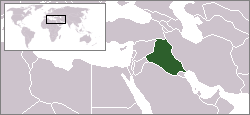Nearly 25,000 Iraqi civilians killed in Iraq, watchdog group claims
Tuesday, July 19, 2005

A report published by the Iraq Body Count project, a British NGO, says that 24,865 civilians have been killed in Iraq in the two years following the start of the US-led invasion in March 2003. Seventy percent of the deaths occurred after the US President George W. Bush proclaimed "the end of major combat" on May 1 2003.
The study, compiled from more than 10,000 media reports, says that 37% (9,270) civilians have been killed by US-led forces. Half of all deaths (53%, 13,178) were caused by explosives, with 60% of those (7,961) being due to air-dropped bombs. Three-quarters of the deaths from air-dropped bombs were during the invasion before May 2003.
The report also states that 3,598 have been killed since May 2003 by non-Coalition bombing incidents, while 1,904 were killed by air-dropped bombs in the same period.
The study recorded that 82% of all deaths were adult males and 9% were adult women, although half of those killed by air-dropped bombs were children. In total, women and children accounted for about 18% of all civilian deaths.
Anti-occupation forces/insurgents accounted for 9% of the deaths, while criminal violence was blamed for 36%. The 28 page dossier also claimed that the situation in Iraq is getting worse. The fatalties in the second year after the invasion were twice as high as in the first year after the end of the war. At least 42,500 civilians were reported wounded.
More than a third of the report was based on the work of Reuters, the Associated Press and Agence France Presse. Three-quarters of reports had at least one primary source, while 23% had two or more.
The Iraqi government disputed the figures. The Ministry of Health's figures recorded 6,629 deaths in the year leading up to April 2005, one-third of which were due to "terrorist incidents", with the remainder due to coalition forces. The Ministry of Interior, which also records deaths in the armed forces, reported 8,175 Iraqis were killed between July 2004 and May 2005.
Reuters noted that the figures apparently fail to note the number of people killed by suicide bombers in the last 18 months - with over 2,000 lives taken by car bombers, while the report claims that only 1,000 people have been killed by suicide bombers over 24 months. Reuters also pointed out that the report may underestimate deaths, as the media - the basis for the report - focuses mainly on Baghdad.
"The international forces try to avoid civilian casualties, whereas the terrorists target civilians and try to kill as many of them as they can," the government said in a statement

The US military also disputed the figures and said it is doing everything to avoid civilian casualties. "Since the start of Operation Iraqi Freedom until now, we have categorically not targeted civilians", said Lieutenant Colonel Steve Boylan, a spokesman for the US military in Baghdad.
"The ever-mounting Iraqi death toll is the forgotten cost of the decision to go to war in Iraq. On average, 34 ordinary Iraqis have met violent deaths every day since the invasion of March 2003", said Professor John Sloboda, one of the authors of the report. He stressed that "neither the US nor the UK governments have begun to systematically measure the impact of their actions in terms of human lives destroyed."
The Iraqi Body Count group is based mainly in the Sheffield area of the United Kingdom. The co-founders are a human-rights campaigner, Hamit Dardagan, and Professor Sloboda, a psychologist at the University of Keele who is also a leading anti-war campaigner. The senior researcher is a retired librarian who last worked as the Head of Acquisitions in Keele University Library, and now runs an anti-war mailing list in the Sheffield area.
Other studies
[edit]There have been two other studies into the number of civilians killed in Iraq since March 2003.
The first to be published was a report in the British medical journal The Lancet in October 2004, stating that there had been 98,000 "excess deaths". The report was based on a questionnaire given to 998 households in 33 randomly-selected areas of Iraq, intended to be a representative sample. Of the total, 57,600 were given as being caused by accidents and disease, with the rest due to violence. The report had an extremely large margin of error - the 95% confidence interval (ie less than a 0.05% chance of being a fluke) range was from 8,000 up to 194,000.
The second report was the UN Development Program Iraq Living Conditions Survey, published in May 2005. This sampled 21,668 households in 2,200 areas, using similar selection and interpretation techniques as the Lancet study. This study recorded 24,000 "conflict-related deaths", with a 95% confidence interval of 18,000 to 29,000.
Sources
[edit]- "Iraq Body Count Press Release" — Iraq Body Count project, July 19, 2005 (including summary of findings)
- "A Dossier of Civilian Casualties in Iraq (pdf)" — Iraq Body Count project, July 19, 2005 (pdf file)
- "25,000 civilians killed since Iraq invasion, says report" — The Guardian, July 19, 2005
- "Iraq war takes heavy toll on civilians" — Reuters, July 19, 2005

